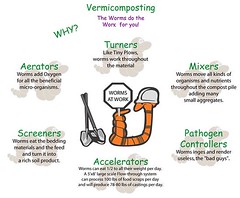 We have recently discovered the benefits of composting. I had been thinking about it for a while - every time I threw a banana peel into the garbage -there's got to be a better use for this. So, we looked more into it at the Burning River Fest. The people from The New Agrarian Center were very helpful, as was the guy from Great Lakes Brewing Company. Both are master composters.
We have recently discovered the benefits of composting. I had been thinking about it for a while - every time I threw a banana peel into the garbage -there's got to be a better use for this. So, we looked more into it at the Burning River Fest. The people from The New Agrarian Center were very helpful, as was the guy from Great Lakes Brewing Company. Both are master composters.Here's what we did - it's pretty simple. We bought a storage container (a big Rubbermaid one), some mesh screen, organic dirt, and 1,000 red worms. Drilled holes in the container - worms need to breathe air - and filled it with 6 inches of organic dirt and wet strips of newspaper and computer paper. This bedding is supposed to be moist, not dripping wet. The compost bin was set up in the basement, to avoid smell and dog curiosity, and so it could be bigger than under-the-sink. We left the light on for the first week to discourage the worms from escaping. Next, we collected all of our food scraps - banana peels, strawberry tops, bell pepper cores, onion peels, coffee grounds, etc. - and buried them under 2 inches of bedding. Now the worms take over. We're supposed to put the food in a different place each time and add new bedding every 2 months. (Don't put meat in your compost - it'll attract rodents)
What's the benefit of having a pound of red worms chewing up your food? Well, the whole process creates worm castings, which is this magical organic fertilizer that you can use in your garden. Essentially, it's natural recycling. We eat the food, feed it to the worms, they turn it into fertilizer that we'll use to grow herbs, which we'll eat in the spring. Aside from the initial set-up, it doesn't take a lot of work to maintain, and in about 4-6 months we'll have some pretty awesome soil for our garden.
Wikipedia does a good job of describing vermicomposting, or you can Blackle it. Worms Eat My Garbage is supposedly the definitive composting guide. The Village Green does outdoor composting, which is an excellent way to get rid of weeds and fallen leaves. If you do start a compost bin, don't dump your worms in the garden - red worms are not native to North America, and are an invasive species, which can threaten other earthworms.
(Here's the rest of the worm song)

No comments:
Post a Comment